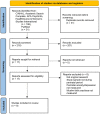Faith Practices Reduce Perinatal Anxiety and Depression in Muslim Women: A Mixed-Methods Scoping Review
- PMID: 35686180
- PMCID: PMC9170987
- DOI: 10.3389/fpsyt.2022.826769
Faith Practices Reduce Perinatal Anxiety and Depression in Muslim Women: A Mixed-Methods Scoping Review
Abstract
Higher rates of depression and anxiety are reported among women who belong to racial and ethnic minority groups, contributing to adverse birth outcomes, and remains a taboo topic within the global Muslim community. Non-pharmacological coping mechanisms such as prayer may be employed to reduce perinatal depression and anxiety, however the literature is sparse on the use of this intervention among pregnant Muslim women. Therefore, we aimed to conduct a scoping review examining the use of Muslim faith practices on anxiety and depression in perinatal period. Nine studies were identified that demonstrate that Muslim faith practices reduce perinatal anxiety and depression symptoms. These studies demonstrate that prayers and other faith-based practices, including reciting parts of the Quran, saying a Dua, and listening to audio recordings of prayers are all effective in decreasing anxiety, depression, stress, pain and fear in Muslim women during pregnancy, during childbirth, during an unexpected cesarean section, and when experiencing infant loss. Despite the scoping review's small sample size, findings confirm that incorporation of faith practices effectively reduces perinatal depression and anxiety among Muslim women and should be utilized in clinical settings for non-pharmacological management of perinatal mood disorders.
Keywords: Muslim; faith; mental health; postpartum; pregnancy.
Copyright © 2022 Simonovich, Quad, Kanji and Tabb.
Conflict of interest statement
The authors declare that the research was conducted in the absence of any commercial or financial relationships that could be construed as a potential conflict of interest.
Figures
References
Publication types
LinkOut - more resources
Full Text Sources


